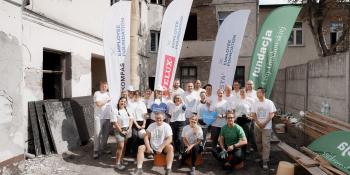
From Empty Spaces to Homes: Abandoned Tenement in Piaseczno Gets a New Lease of Life
On Monday, 8 September, renovation works began at 1 Nadarzyńska Street, led by a team of 21 employee volunteers from Australia, Canada, China, Croatia, Denmark, France, Italy, Latvia, Poland, Slovakia, Ukraine and the United Kingdom. Swapping their work places for paint rollers, the group traded business attire for hard hats and work clothes, following safety training before diving into four days of hands-on renovation.
From abandoned to home
The local municipality has granted the Lena Grochowska Foundation 40 years’ free use of the historic tenement house in central Piaseczno. The building, long abandoned but once a rental tenement, will be transformed into an innovative space combining residential and community functions.
“By revitalising this place, we will create over 20 supported apartments — functional, safe, and accessible. We want people in difficult situations to have not only a roof over their heads, but also a real path to independence and opportunities to integrate with the local community,” says Aneta Żochowska, Director of the Lena Grochowska Foundation. “We create this place for people at risk of social exclusion — people with disabilities, those moving on from homelessness, seniors, and young people leaving foster care. Supported apartments are a form of assistance that helps people take the first step towards independence. With guidance from trainers and support workers, residents will learn to run their own households — from planning shopping and cooking to managing a budget. In this way, we can help reduce housing exclusion among particularly vulnerable groups.”
“The Piaseczno tenement house is one of many examples of how we can bring abandoned spaces back to life — buildings that stand empty today but could be safe homes tomorrow. At Habitat for Humanity Poland, we work across the country to show that change is possible — with the help of partners, volunteers, and people of goodwill,” adds Mateusz Piegza, Programme Director at Habitat for Humanity Poland.
The renovation of the building at 1 Nadarzyńska Street is a step towards the renewal and better use of vacant properties — and a chance to improve the quality of life for many residents. It is also an opportunity to draw attention to the enormous potential of adapting unused premises.
According to the 2021 National Census, there are as many as 1.8 million vacant properties in Poland. Yet, while hundreds of thousands of people in Poland are struggling to find a safe place to call home, the Empty Spaces to Homes model offers a powerful solution. By transforming vacant buildings into secure, affordable housing, we not only address urgent shelter needs but also lower carbon emissions by repurposing existing structures. The greenest building is the one that’s already built - This approach lowers construction and energy costs, revitalizes communities, and delivers value to all stakeholders—residents, the public sector, and the environment alike
Volunteering with a mission
Corporate volunteering is one of the pillars of Habitat for Humanity’s activities.
“Thanks to the involvement of company employees, we don’t have to outsource minor but costly services. Employee volunteering not only shows the challenges people face, but also demonstrates the power of community and collective action,” emphasises Mateusz Piegza from Habitat for Humanity Poland.
“The most valuable thing is meeting new people and the goal that unites us: building something better for others. Giving a part of yourself on this place where you knows you’re building a better future for someone and you’re leaving behind kilograms of sweat. I’m proud that place that was empty will once again be filled with laughter, joy and tears. That an empty and ugly place in city is getting new life and letting others live. I’m happier because I contributed to this.” says Łukasz, a volunteer.
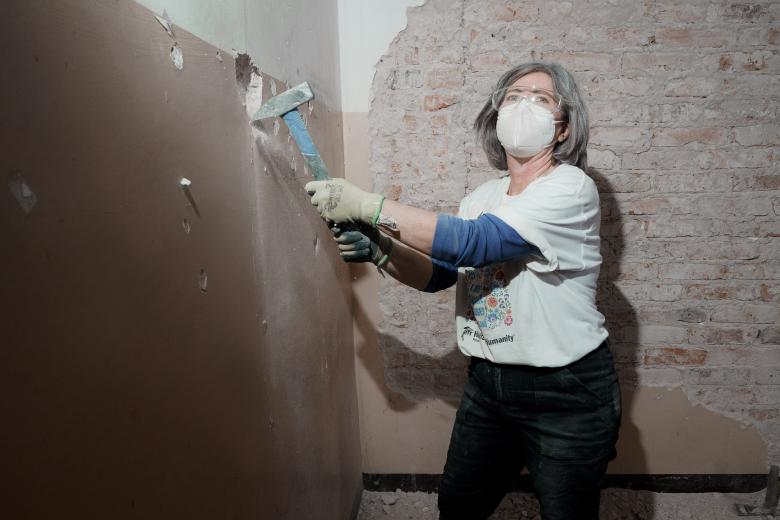
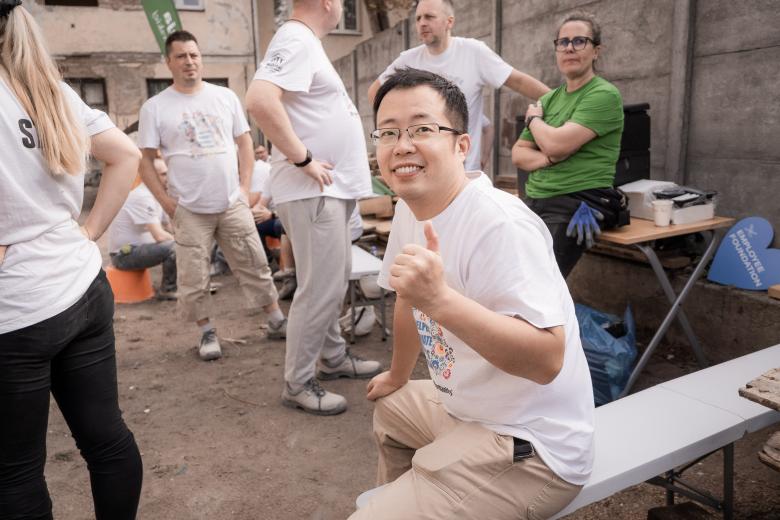
The Employee Foundation of the VKR Group, parent company of VELUX Poland, stands alongside Habitat for Humanity in a long-term partnership rooted in shared values and a common belief that everyone deserves a safe and decent place to call home. The foundation supports the Empty Spaces to Homes initiative because it directly addresses two urgent challenges: the severe shortage of affordable housing and the need to cut carbon emissions by repurposing vacant buildings into affordable, energy-efficient homes. Renovating instead of demolishing saves materials, avoids unnecessary waste, and preserves the heritage and character of old buildings, while transforming them into healthy, inclusive living spaces.
As part of this commitment, 21 VKR Group colleagues are joining renovation works in Piaseczno, while thousands more participate globally in the “Donate Your Steps” walking challenge. Every step taken is matched with a financial donation to support Habitat’s mission, proving that collective action—on site and around the world—can bring new life to empty buildings and new hope to the people who will live in them. DOVISTA and VELUX are also contributing to the transformation by donating new, high-quality windows for the building — bringing in more daylight, improving ventilation, and creating a healthier, more energy-efficient living environment for future residents.
“We are proud to support Habitat for Humanity through this long-term partnership, which is grounded in shared values and a common belief that everyone deserves a healthy, safe and decent place to live. It is inspiring to see colleagues from across the VKR Group coming together in a Donate Your Steps walking challenge for a cause that brings new life to old buildings - and new hope to families,” says Robert Purol, Board Member, Employee Foundation of the VKR Goup & General Manager, NB Polska Sp. z o.o.
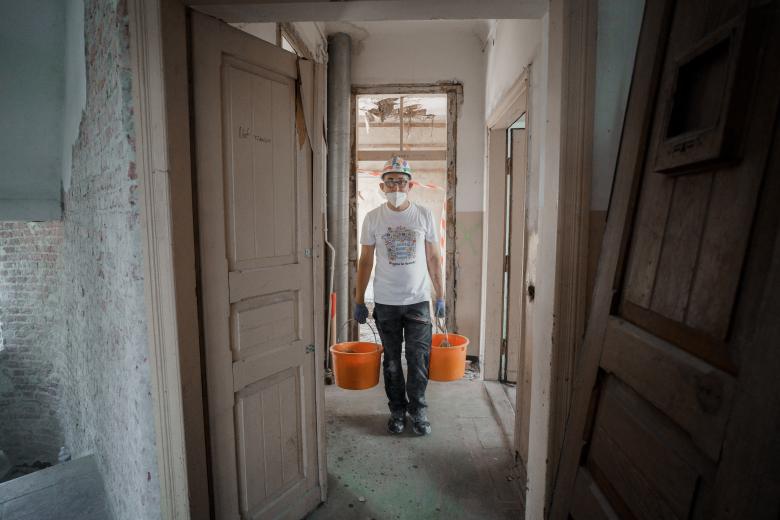
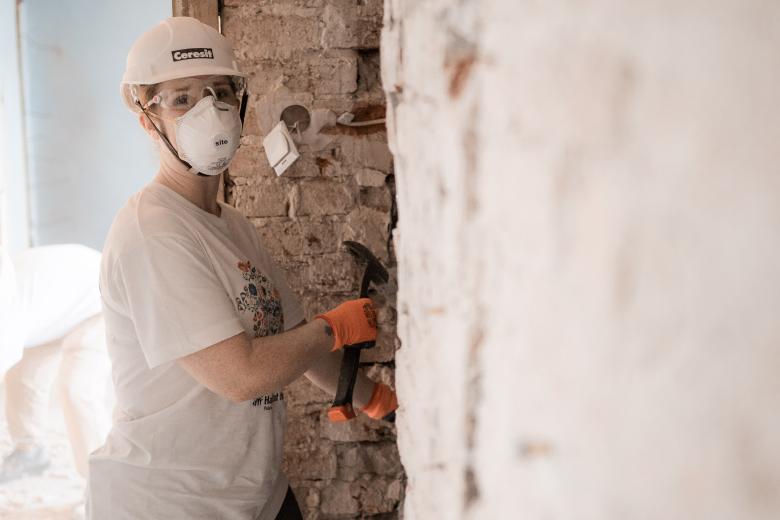
“This project can only happen because we work hand in hand: business, NGOs, and local government. Each sector brings its strengths — skills, volunteers, funding, know-how, and institutional support. Only in such a partnership can we quickly and responsibly turn empty buildings into homes and create lasting resident support programmes,” adds Aneta Żochowska from the Lena Grochowska Foundation.
“Even while I was still in prison, I was determined to change and started planning my life beyond the walls,” says Krzysztof, one of the participants in the Foundation’s housing programme. “I couldn’t count on any support from the institution, so I turned to the Lena Grochowska Foundation. After my release I was given the chance to live in a supported apartment and to take up employment — help that came at exactly the right moment. Today I’m a ceramics instructor, working with people with intellectual disabilities at the Foundation’s ceramics studio. The project in Piaseczno is for people like me — it makes you feel safe and gives hope for a better tomorrow.”
The comprehensive renovation is supported by Arche Group, which has many years of experience in restoring historic buildings. This support will help restore the building’s former glory while adapting it to modern standards.











